- Home
- Keith R. A. DeCandido
DIPLOMATIC IMPLAUSIBILITY Page 10
DIPLOMATIC IMPLAUSIBILITY Read online
Page 10
“Yes. And, I might add, topaline production has increased since I took over.”
“As has al’Hmatti resistance,” Klag said.
Tiral gritted his teeth. “Yes.”
“Mass executions have failed?” Drex asked.
Nodding, Tiral said, “I have increased the number with each rebel action, but these creatures seem to care little about their own deaths. I also had their emperor speak out against the rebels.”
“They have an emperor?” Drex said.
Klag bared his teeth at his first officer. He had assumed that Drex had familiarized himself with the files on taD.
Worf said, “Before being conquered, the al’Hmatti had an emperor and ministry to govern the world. The empire overseers left the ministry intact for the day-to-day operation of the planet. Since the emperor also served as the al’Hmatti’s spiritual leader, the governor at the time thought it best to leave her in place, but remove her political power.”
“Putting the emperor to death was not an option, either,” Tiral said. “He is old and beloved, and would only serve as a martyr to the rebels’ cause. Better that he speak on our behalf.” Tiral snarled. “But that, too, has failed.”
Worf asked, “Have you attempted negotiation?”
“Are you mad? These are jeghpu’wI’. You do not negotiate with them—you force them to serve you, or you kill them.”
“Since neither tactic has been effective,” Worf said, “perhaps it is time to try something else. Do you have any way of contacting the rebels?”
“If I did, I would have crushed them by now.”
Worf nodded. “As I suspected. I would like to meet with the prime minister.”
Tiral waved his hand dismissively. “That is a waste of time. Prime Minister em’Rlakun does nothing without my express orders. She knows nothing I have not told her.”
“Perhaps that is so. Nevertheless, I will meet with her tonight in the council chambers.”
Klag said, “That, Ambassador, would be foolish. It’s a security risk for you to beam to taD. All meetings should either take place on the Gorkon or here.”
“I appreciate your concern, Captain,” Worf said, “however, that is a risk I am willing to take. And I assume Bekk Krevor will accompany me to ensure my safety.”
“Ambassador—”
“Are you questioning my decision, Captain?” Worf asked.
Klag started to say “Yes,” but then thought better of it. “You are in command of the mission, Ambassador. If you wish to die a fool’s death, that is your right.”
Worf turned back to Tiral. “Have you determined the source of the ships the rebels used to attack your satellite last week?”
Tiral nodded. “The rebels had a base on the moon, which we have eliminated. At first, we thought it was their primary headquarters, but that is not the case—they just used it as a place to acquire offplanet material. We don’t know where they got the ships. They were sublight skimmers of a type that was very common in this sector thirty years ago. In any case, all lunar operations have been shut down—the mining we did there was of little import—and any vessel approaching the moon is shot on sight.”
Speaking of security risks, Klag thought. Still, Tiral’s response was the correct one. Not that it did any good.
“I believe that is all,” Worf said, standing again.
Tiral began, “I will meet you in the council chambers at—”
“No,” Worf interrupted. “I will meet with Prime Minister em’Rlakun alone.”
Letting out a snort, Tiral said, “If that is what the ambassador wishes, so be it. My guards will, of course, also be present.”
“That is not necessary, Governor.”
“I disagree. Besides, it is already done. At least two guards are posted in every public room on the planet.” Tiral stood and bared his teeth. “These are dangerous times, Ambassador. Attempts on the lives of Klingons have become commonplace. Someone of your rank will be a target the moment you set foot on taD. You do, after all, still appear to be a Klingon.”
Klag was not surprised to see Worf let this insult go by. The ambassador simply looked at Klag, who started to rise as well—until Tiral said, “I wish to speak to the captain and commander about other military matters.”
Worf hesitated a moment, then simply inclined his head and left the room without a word, Krevor following.
As soon as the doors closed behind them, Tiral turned on Klag, spittle flying from his mouth. “This is your idea of help? A traitor from the Federation?”
“You will modify your tone, Governor,” Klag said quietly, “or I will modify it for you. I promised you nothing but a good word with the High Council. I gave you that. The orders on this mission came from Chancellor Martok himself. I fail to see what more you want.”
“I want a Klingon to solve this problem, not that petaQ who just left my office.”
Klag looked at Drex. Worf was, after all, a House-mate of Drex’s—but nothing was forthcoming from his first officer. “Ambassador Worf is who you have, Governor. I suggest you make use of him, or risk him going through with his threat.”
“You would permit that?”
Klag was starting to wonder if speaking on Tiral’s behalf had been such a good idea. “Governor, my orders from the chancellor were to escort the ambassador to taD and obey him for the duration of the mission. I would need a very convincing reason to disobey those orders. I doubt you can give me one. Now then, are there truly military matters to discuss, or was that simply an excuse to whine to me about the ambassador?”
Tiral snarled and said, “That is all, Captain. If you will excuse me, I have work to do.”
Klag rose and left the room, his guard and Drex following behind.
As they traversed the corridors toward the transporter room, Klag said, “I had expected you to be familiar with the mission profile, Commander.”
“I wasn’t aware that it was necessary, Captain,” Drex said. “I will attend to it upon our return to the Gorkon.”
“See that you do,” Klag said.
His right arm itched.
* * *
As soon as Worf materialized in the transporter chamber on taD, he adjusted the temperature control on his thermal suit to a higher setting. The reports hadn’t prepared him for how cold it was here.
A white-furred al’Hmatti technician operated the transporter platform. Behind him stood two armed Klingons, with another two at the door.
The reports hadn’t prepared him for how big the al’Hmatti were, either. He knew that they were generally taller than Klingons, but he hadn’t expected them to so dwarf him. Never in his adult life had Worf felt as small as he felt in their presence, first on the satellite and now here. It didn’t sit well with him.
Another al’Hmatti stood in front of the platform. Although the al’Hmatti did not generally bother with much by way of clothing—their fur, blubber, and metabolism were far more adequate protection from the elements than any textile—this female wore a leather vest decorated with a Klingon emblem over her silver-gray fur.
She made a beeline for Wu. “Greetings,” she said, bending low to the human, “and welcome to taD. I’m Prime Minister em’Rlakun. You must be Ambassador Worf.”
Worf ground his teeth.
“I’m afraid I mustn’t, ma’am, as the real Ambassador Worf might get cross,” Wu said, indicating Worf. “This is who you’re looking for. I’m merely his aide.”
The prime minister’s eyes narrowed, and she straightened up. Worf knew from his reading that this was a sign of contrition, but it only served to make her more physically imposing. “Ambassador, please accept my humblest apologies. When I was told that the Federation ambassador was coming to meet with me, I simply assumed—”
Quickly, Worf said, “Think nothing of it,” his breath condensing in the air.
“If you will follow me, please, Ambassador,” she said, “we can get right down to business.” With that, em’Rlakun lowered herself onto all f
ours and loped out of the room through an open entryway. Even at this posture, she came up to Worf’s chest.
According to the same files that told Worf of taD’s chill and the al’Hmatti’s size, the council chambers were like many al’Hmatti structures: carved directly out of rock and ice, akin to Earth igloos. Very few had interior doors. Carpets lined the floors, but the walls of this building were all solid ice. Worf noticed that, as with the satellite, images of Tiral decorated most of the walls. Unlike the satellite, armed Klingon guards were always within sight—but the al’Hmatti who scurried about, performing odd menial functions, didn’t even seem to notice those guards.
No wonder most of the Klingons live in orbit, he thought. The temperatures went beyond inhospitable. Heaters were out of the question, since they would adversely affect the building’s very structure. The only Klingon-built constructions on the planet were connected to the topaline mines—Worf assumed they, at least, were properly heated.
The prime minister led them around a corner into a large antechamber that had several more images of Tiral on the walls. A Klingon sculpture sat on a pedestal in one corner. Cushions were laid out around a circular stone slab that Worf assumed was meant to serve as a table. Two comfortable-looking leather chairs had been provided, in deference to the bipeds.
As em’Rlakun lay down on one of the cushions, she said, “Have a seat, please, my friends.”
Worf sat in one of the chairs, with Wu taking the next seat. Krevor took her place next to the two guards who stood at the entryway. Worf had hoped to dismiss the guards so that he could speak to em’Rlakun without every word being reported back to Tiral. Listening devices were not an issue. Worf carried three different confusers of his own design that should have scrambled any such device in his immediate area. Situated in the Federation emblem on the left lapel of his vest, they had been running since the moment he had beamed onto the Gorkon.
Unfortunately, even if Worf dismissed the guards from the room proper, they would still be able to hear what was being said through the wide entryway. He supposed he would have to live with it.
An old-looking al’Hmatti with ice-white fur entered the room. The prime minister asked, “Is there anything we can get you or your aide to drink, Mr. Ambassador? The serving staff makes a fine chech’tluth.”
“Nothing for me,” Worf said.
Wu looked at the al’Hmatti servant. “Do you have anything warm?”
The servant said, “We have tea.”
Smiling, Wu said, “If it’s Klingon tea, I’m afraid that’s fatal to my kind. A raktajino would be nice.”
“Of course, sir,” the servant said, and loped off on all fours.
Gazing upon Worf with almost jet-black eyes, em’Rlakun said, “I must admit, Mr. Ambassador, I’m a bit—well, confused as to why you wish to see me.”
“My task is to solve the ongoing difficulties between your people and Governor Tiral’s.”
“My people?” The nostrils on em’Rlakun’s snout widened and she made an odd hissing noise. Worf realized that this was an al’Hmatti laugh. “Mr. Ambassador, my people support Governor Tiral. What you need is to solve the problems between all of us and the rebels.”
“So you have no way of putting me in contact with the rebels?”
“I wish I did, Mr. Ambassador, I truly wish I did.”
The servant returned, this time walking only on his hind legs, carrying a tray with a mug of tea and a glass of raktajino. He handed the latter to Wu, and then placed the tray on the table in reach of em’Rlakun.
Reaching for the tea with one paw, em’Rlakun continued: “I just don’t understand these rebels, Mr. Ambassador. Our standard of living is so much better than it was before. We owe your people so much.”
“My people, in this case, Prime Minister, are not the Klingon Empire.”
“I beg your pardon?”
“I am here as a representative of the United Federation of Planets. Your government made an appeal to the Federation after the Klingon overseers were removed four years ago.”
Again, em’Rlakun laughed. “That appeal was made by a governing body that no longer exists, Mr. Ambassador. I suppose, technically, they were the legitimate ruling body at the time, but Governor Tiral had them all put to death after the empire took over again. And deservedly so—after all the empire has done for us, that type of behavior was just insane. You know, most of the people on this world didn’t even want the Klingons gone. Believe me, very few complained when the previous government was toppled. I was more than happy to take over as prime minister afterward, and I was honored that Governor Tiral thought so highly of me.”
Worf leaned back in his chair. “Anything would be helpful, Prime Minister. Observations of their movements, perhaps.”
“I don’t have anything that Governor Tiral doesn’t already have, Mr. Ambassador. And believe me, if he had a way of tracking them down, he’d have crushed them by now.” Rising up from the cushion, em’Rlakun loped over to Worf on all fours. “I’m sorry I can’t be of more help, Mr. Ambassador.”
Worf stood up. “That is quite all right. This has been an enlightening journey.”
Next to him, Wu stood up—having, Worf noticed, only taken a sip of his raktajino.
“If there’s nothing else, I have several matters to attend to—including some tasks for Governor Tiral.”
“Of course, Prime Minister,” Worf said. “Thank you for your time.”
Kurak knew that eating in the mess hall was a mistake the minute she saw Leskit sitting there. But she had been going mad eating in her quarters all the time. She thought that maybe—maybe—she could stand the presence of her shipmates for the duration of a meal. To play it safe, however, she had waited until after the primary shift had eaten, when the mess hall wouldn’t be crowded.
However, there was Leskit, halfway through a rokeg blood pie. A decent enough pilot who treated the engines well, Leskit had made several clumsy attempts to attract her attention, which she had heretofore ignored.
Not that she didn’t find him attractive. He was a bit on the old side, but he had a certain charm to him. And she admired a man who wore the trophies of battle around his neck. So few did that anymore—took pride in their work. It was a lost art.
But then, it depended on the work, didn’t it?
Naturally, he spoke up as soon as she entered. “Commander! Please, join me—this is fine blood pie, and it would be a travesty not to share it.”
“Very well,” she said, resigned to sitting across from the pilot.
“It’s good to see you out and about during your offduty time.” Leskit pushed the plate of pie toward her. “I was starting to think you did nothing but sleep and do your duty.”
“I also eat,” Kurak said. “But that, like sleeping, I prefer to do in private.”
“A pity. I’ve always felt that both activities were better shared.”
Ignoring the implication, Kurak took a bite of pie. To her surprise, it was excellent. She’d never tasted replicated food this good. Unless . . . “ Is this handmade?”
“No, simply a fine replication. A tribute to the genius of you and your fine staff.”
With a growl, Kurak said, “Vall.”
“Repulsive little worm, but he has his uses, you have to admit.”
“I don’t have to admit anything, Lieutenant.”
“Please, Kurak, we’re off-duty. Call me Leskit.”
“I will call you ‘Lieutenant,’ and you will address me as ‘Commander,’ is that understood?”
“So formal, Commander. I’m disappointed.”
“Get used to it. Let me put it to you simply: I’m not interested. Not in you, nor any other male on this ship.”
Leskit smiled. “On behalf of the humble, rejected males of the Gorkon, may I ask why?”
Taking another bite of the blood pie, Kurak said, “Because you’re an idiot. You’re all idiots.”
“All? That’s rather general.”
“You’re
in the Defense Force, which proves it right there,” she muttered.
Leskit laughed. “I might point out, Commander, that you’re in the Defense Force as well.”
“Don’t remind me. It wasn’t my idea.”
“Has our esteemed chancellor issued a draft that I’m unaware of?”
Kurak rolled her eyes. “No. My father, however, did. After a fashion.”
Leskit raised an eyebrow.
She sighed. “Prior to the war, I was a warp field specialist. It would not be immodest to say I was one of the best.”
“Yes, I understand that you designed the Negh’Var.”
Kurak blinked. “I was the main designer, yes. My family did not approve. Both my parents, all four grandparents, and my three brothers were soldiers. I prefer working in a lab to working on a starship, however, and I told them that. Repeatedly.”
“I take it the war changed things.”
“Wars often do,” Kurak said, pausing to take another bite of the pie. “My father threatened to banish me from our House if I did not enlist. So I did. I was given a field commission in light of my work in ship design, and I spent the war holding ships together while the Jem’Hadar did their best to tear them apart.”
“But the war is over, Commander. Why stay?”
“My parents, my brothers, my grandparents—they’re all dead. I am the only able adult left in our House. I cannot break the tradition now—at least not until my nephews are old enough to join the Defense Force. The House of Palkar must always serve the empire,” she said bitterly, quoting a line that had been drilled into her since birth. “But understand this—I will serve for as long as I must. That is all. You will cease your attempts to befriend or seduce me, and you will leave me alone.” She reached for the blood pie, then glowered at it. “And my subordinates will follow my orders.”
She stood up and threw the remainder of the pie across the room, narrowly missing a bekk’s head.
Then she left the mess hall in search of Vall. She had had quite enough of that Lubbockian slime devil’s disobediance.
As soon as he walked into his and Wu’s quarters, Worf said, “Call up the prime minister’s schedule for the last three months. Compare it to the governor’s log for the same period. I wish to see how many of the tasks that Tiral has delegated to em’Rlakun have actually been performed.”

 Alien
Alien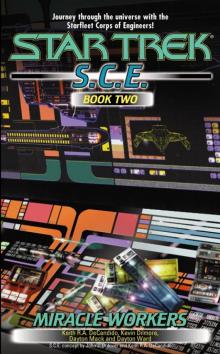 Miracle Workers
Miracle Workers Articles of the Federation
Articles of the Federation Supernatural Heart of the Dragon
Supernatural Heart of the Dragon War Stories: Book Two
War Stories: Book Two The Zoo Job
The Zoo Job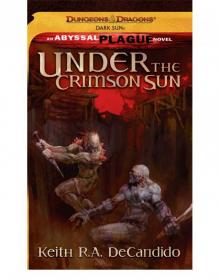 Under the Crimson Sun
Under the Crimson Sun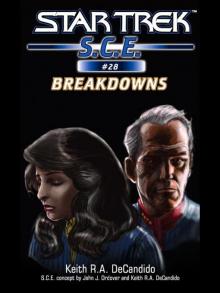 Breakdowns
Breakdowns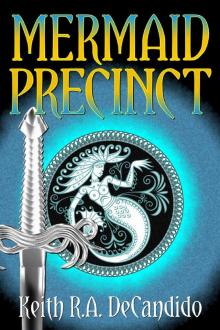 Mermaid Precinct (ARC)
Mermaid Precinct (ARC) Supernatural 1 - Nevermore
Supernatural 1 - Nevermore STAR TREK - The Brave and the Bold Book One
STAR TREK - The Brave and the Bold Book One Four Walls
Four Walls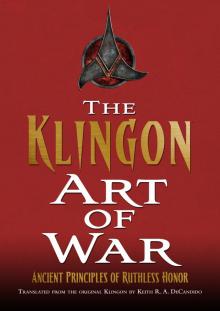 The Klingon Art of War
The Klingon Art of War Blackout
Blackout War Stories: Book One
War Stories: Book One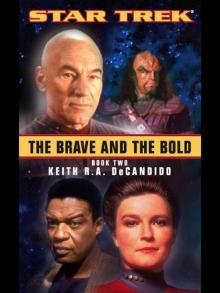 The Brave and the Bold Book Two
The Brave and the Bold Book Two Honor Bound
Honor Bound Sleepy Hollow: Children of the Revolution
Sleepy Hollow: Children of the Revolution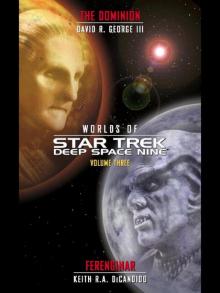 Worlds of Star Trek Deep Space Nine® Volume Three
Worlds of Star Trek Deep Space Nine® Volume Three Star Trek: TNG: Enterprises of Great Pitch and Moment
Star Trek: TNG: Enterprises of Great Pitch and Moment Genesis
Genesis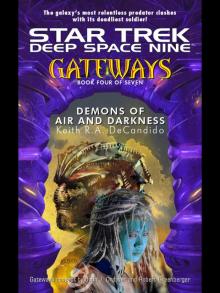 Demons of Air and Darkness
Demons of Air and Darkness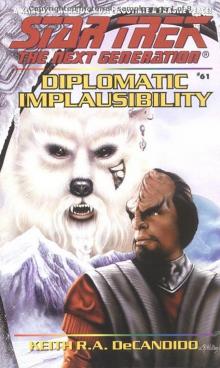 Star Trek - TNG - 61 - Diplomatic Implausibility
Star Trek - TNG - 61 - Diplomatic Implausibility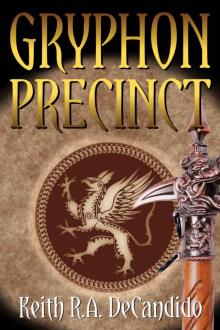 Gryphon Precinct (Dragon Precinct)
Gryphon Precinct (Dragon Precinct)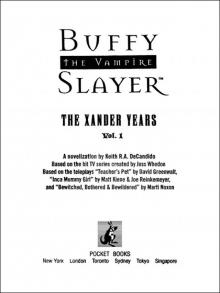 THE XANDER YEARS, Vol. 1
THE XANDER YEARS, Vol. 1 Nevermore
Nevermore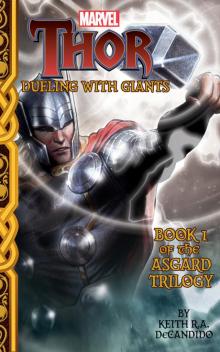 Thor
Thor The Brave And The Bold Book One
The Brave And The Bold Book One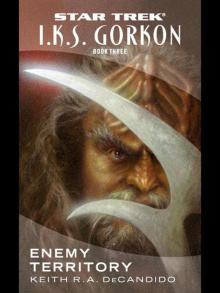 I.K.S. Gorkon Book Three
I.K.S. Gorkon Book Three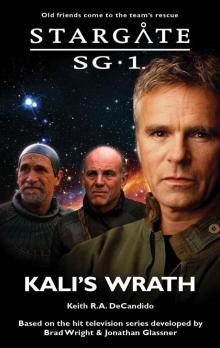 STARGATE SG-1: Kali's Wrath (SG1-28)
STARGATE SG-1: Kali's Wrath (SG1-28) Bone Key
Bone Key Guilt in Innocece
Guilt in Innocece Star Trek - DS9 Relaunch 04 - Gateways - 4 of 7 - Demons Of Air And Darkness
Star Trek - DS9 Relaunch 04 - Gateways - 4 of 7 - Demons Of Air And Darkness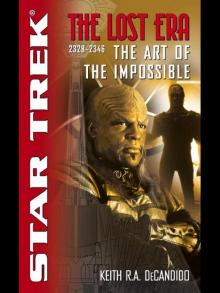 The Art of the Impossible
The Art of the Impossible I.K.S. Gorkon Book One: A Good Day to Die
I.K.S. Gorkon Book One: A Good Day to Die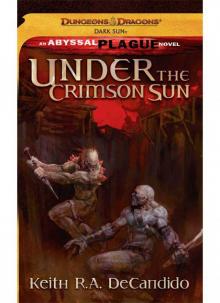 Under the Crimson Sun (the abyssal plague)
Under the Crimson Sun (the abyssal plague)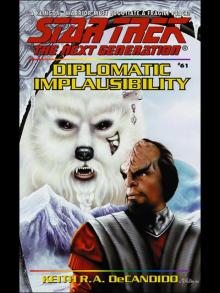 DIPLOMATIC IMPLAUSIBILITY
DIPLOMATIC IMPLAUSIBILITY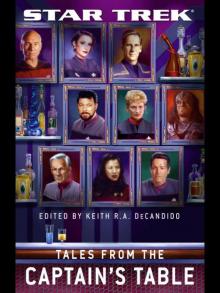 Tales from the Captain's Table
Tales from the Captain's Table A Burning House
A Burning House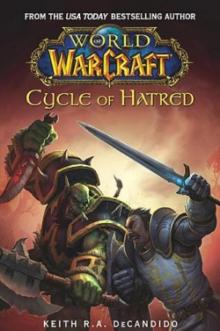 Cycle of Hatred (world of warcraft)
Cycle of Hatred (world of warcraft)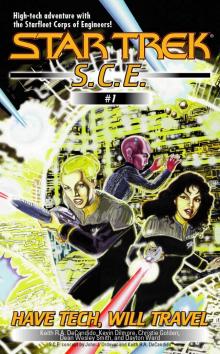 Have Tech, Will Travel
Have Tech, Will Travel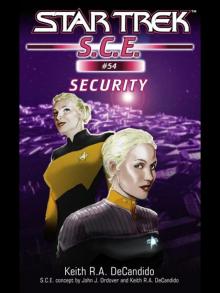 Security
Security